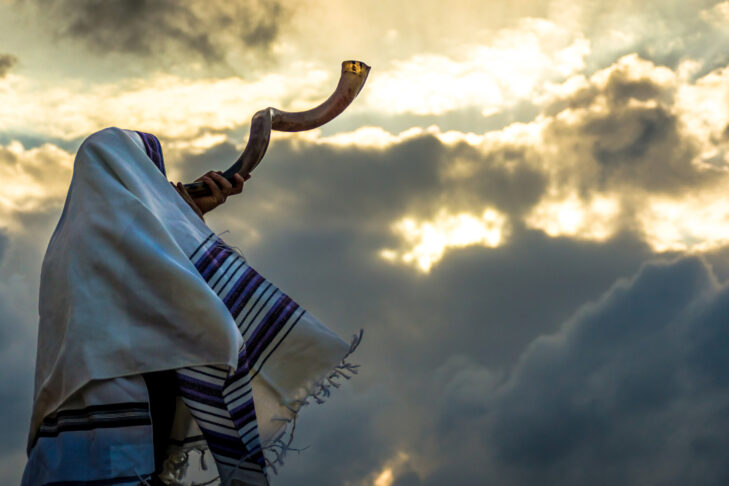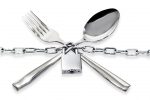It felt sacrilegious, but I had nowhere else to put my granola bar except inside my tallis bag. For many, it would be actually sacrilegious and inappropriate to bring food into the sanctuary. But I had to eat. Even as a rabbinic student at Hebrew Union College in New York City, serving as co-leader for High Holy Day services for the Brooklyn Jewish community in Park Slope, I had to eat.
The month prior, after an intensive and emotionally draining summer as a chaplain intern at Memorial Sloan Kettering Cancer Center, I developed shingles. The virus was triggered by stress and exhaustion (and maybe on account of my old soul) and I missed nearly a month of my fifth year of rabbinical school. By the arrival of the High Holy Days, I was on the pathway to healing—but I was still weak, tired easily, and there was no way that I could fast in observance of Yom Kippur, and certainly not while leading a congregation in prayer. So I decided that I would eat enough to sustain my health.
As I made my way to the synagogue, passing an abundance of New York pizza, bagels and every other type of cuisine imaginable, my apple slices, PB&J and granola bars would become my Yom Kippur “fast.” As far as I know, my atonement still made its way through the Gates of Repentance. After that intensive summer of pastoral support I had offered to gravely ill patients, the only thing I really felt needed additional repentance was giving a Kol Nidre sermon the year prior about food.
All of this begs the question: How can you make Yom Kippur meaningful if you cannot or choose not to fast? For some, the question beneath that question is: “How do you make Yom Kippur meaningful at all?” I think the pathway to answering both is a shared journey.
First, a little history: The Torah itself teaches us about Yom Kippur as a Day of Atonement and self-denial (innui nefesh), reporting that anyone who disobeys this rule will be cut off from their people. The Talmud (Yoma 73b) explains that self-denial includes prohibitions to eat, drink, wash oneself, anoint oneself, wear leather sandals or engage in marital relations. This list, compounded by centuries of interpretation, law and custom, underscores the significance of the Yom Kippur observance as we refrain from all life-sustaining measures, beat our chests and bare our souls in repentance. So, we can understand from this list of serious observances why I was concerned about the granola bar in my tallis bag or why some people may be very hesitant—scared even—to eat on Yom Kippur.
Related
The Hebrew words found in the Torah often translated to self-denial—innui nefesh—are key to making meaning out of Yom Kippur without fasting. The essence of these words are to afflict our souls, and there are certainly many other ways to bring out such meaning. To be sure, if you cannot fast because it will bring you harm, do not fast. Our liturgy teaches that prayer, repentance and charity are the keys to pursuing our Yom Kippur atonement. But if you feel that you must fast from something in order to fulfill your Yom Kippur observance, consider these options:
Fast from social media
The meta analysis of social media is that it’s bad for our souls. It causes FOMO, jealousy, shame, grief, miscommunication and even depression. Delete those apps from your phone or, better yet, turn off your phone on Yom Kippur. Instead, go outside and watch God’s social media channel—the faces of humanity and the colors of nature are so beautiful and inspiring. If you are attending shul and your prayer book has English translations or poetry, read them. All of them—even if the clergy is speaking and you’re on the wrong page.
Fast from gossip
It’s hard to do, but especially on a day of returning to our highest moral self, consider the Mussar practice of recognizing the goodness in the people who challenge you the most.
Fast from excess
Commit to living a life that produces less waste, purchase less fast fashion and invest in eating local foods, borrowing from others or joining your local sharing economy (mine is Everything Free JP), start composting and do anything you can to slow down climate change. Also, consider making a donation to a food pantry to “share your bread with the hungry,” as inspired by the prophet Isaiah.
Fast from self-judgment
This seems harder to do given that Yom Kippur is all about scrubbing one’s soul of all of our sins and trespasses, but, of course, what it means is to be gentle with yourself. It is customary to beat our chests on Yom Kippur as we recite the vidui list of transgressions. You can do that ritual, but, after, consider gently patting your heart too. Remember, most of us are imperfect beings trying to do the best we can.
Most importantly, recognize that you are not alone. There are so many people in the Jewish community who, for all sorts of reasons, cannot fast. You do not have to tell anyone how you are observing the day. It can be a private decision, one you make with support from clergy, a discussion with your medical or mental health providers, or you can share your story publicly to inspire others to make the best choices for themselves.
The Jewish community cares about you, too. Check out fabulous leadership and teachings from Chronic Congregation, led by Rabbi Emily Aronson, that provide community for Jews with chronic illness and/or disability. Connect with A Mitzvah to Eat, which supports those who need to connect to fast days, mitzvot or holidays differently to protect their health, save their lives or reduce their suffering. You can read a joint letter encouraging Jewish communal professionals to support those who cannot fast.
Throughout the day of Yom Kippur, there is a custom of wishing people a tzom kal—an easy fast. But fasting isn’t easy, nor should it be for those for whom it would cause harm. Instead, I wish you a meaningful observance. Be safe and be well. And if your blood sugar is low, come find me. I still keep KIND bars in my tallis bag.





